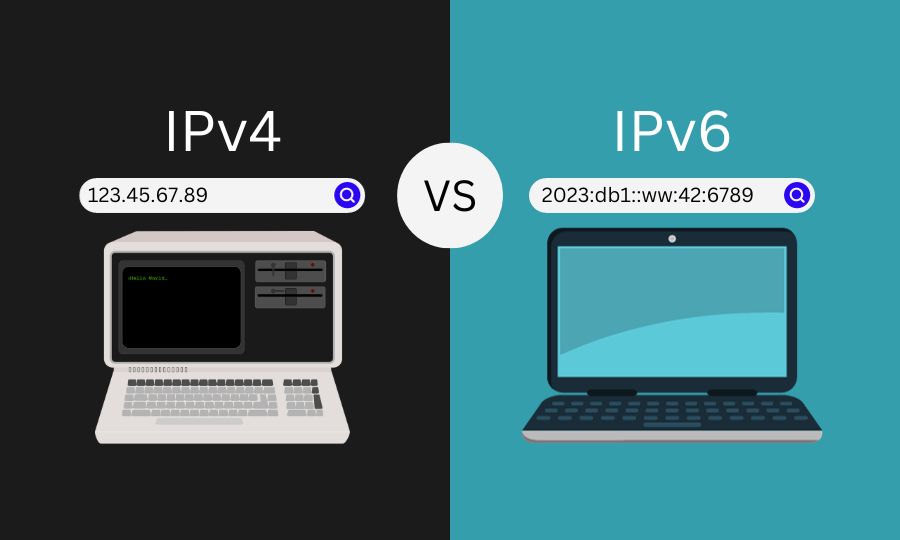An Internet Protocol (IP) address is a unique numerical identifier on every device that links itself to a network that enables devices to exchange and communicate over the internet. IP addresses are the digital addresses which are helpful to direct information between sending parties and receiving parties. There are two significant variants of IP today: IPv4 and IPv6. The internet operates through IPv4, which has had a limited address space for the development of IPv6. IPv6 addresses the shortcomings of IPv4 to provide more capacity and capabilities. In the discussion, their significant difference between IPv4 and IPv6, structures, features and practical uses shall be discussed.
Difference Between IPv6 and IPv4: Key Features
1. Address Length and Format
The address format of IPv4 is 32 bits long. It is basically a four decimal number with dots between them (e.g., 192.168.1.1). IPv6, however, is 128-bit hexadecimal in format. It is divided by colons (e.g., 2001:0db8::1), which provides an address space that is far larger.
2. Complexity of Headers and Processing
The IPv4 headers are less simple and have lots of fields, and processing packets is slower. In IPv6, the header format reduces the number of fields and fixes the length. This makes the routing process more efficient and fast in high-performance networks.
3. Address Configuration
When you buy IPv4 address, know that they can be used either by manual addressing or address assignment through DHCP. IPv6 is configured to use automatic address configuration through Stateless Address Autoconfiguration (SLAAC). This enables the devices to generate their own addresses, which makes network configuration and maintenance much easier.
4. Security and Authentication
IPv6 was built to have IPsec (Internet Protocol Security) as a compulsory option, which guarantees built-in data integrity, authentication and confidentiality. IPv4 has optional IPsec, which is manually configured, and thus, IPv6 is automatically more secure for transmitting data.
5. Quality of Performance and Service
IPv6 has a Flow Label field, which enables improved identification and treatment of data streams. This also improves Quality of Service (QoS). IPv4 does not have this, as it frequently needs some extra protocol to give precedence to real-time transmissions such as voice or video.
Type of Industries Using IPv4 and IPv6 Addresses
IPv4 and IPv6 refer to Internet protocols for identifying network devices. IPv4 has 32-bit addressing, which supports approximately 4.3 billion unique addresses. Hence, IPv6 has 128-bit addresses, which support virtually infinite addresses. IPv6 also has enhanced security, accelerated routing and support of mobile networks and the Internet of Things (IoT).
Telecommunication, cloud computing, smart cities, automotive, and manufacturing are just some of the industries that can utilize IPv6. These industries need massive connectivity, effective data transfer, and safe communication, which the IPv6 system can afford more efficiently than the outdated and restricted IPv4. Make sure you look for the best IPv4 broker for choosing the right option.
Difference Between IPv4 and IPv6: Usage and Adoption
IPv4 Usage
Most global networks continue to lease IPv4 addresses as the primary protocol of internet communication. It is common in home routers as well as VPN, as well as small to medium enterprises. Hence, it is compatible and already has a well-established infrastructure. With the depletion of IPv4 addresses, methods such as Network Address Translation (NAT) can be used to enable more than one device to use a single public IP and in effect, prolong its lifespan.
There are numerous legacy systems and applications that still utilize IPv4. This guarantees its survival. Nevertheless, the increasing number of internet-connected devices is slowly driving the necessity of adopting IPv6.
IPv6 Usage
The adoption of IPv6 is progressively growing, due to the fast development of IoT, cloud computing, and new communication networks. Google, Facebook and Amazon are major ISPs and technological giants that have incorporated IPv6 in their infrastructure to improve connectivity and scalability.
IPv6, with its large address space and enhanced efficiency, can support emergent technologies such as 5G, autonomous vehicles, and smart cities. Enterprises and governments are moving to IPv6 as a way of future-proofing their networks. It helps them in enhancing the performance of routing and removing the use of NAT, which creates a simpler and more direct internet architecture.
Which One Should You Use?
In the decision to rent IPv4 address or IPv6, it is up to you and your network requirements. IPv4 is still applicable to current systems and small networks since it is simple and has extensive support. Nevertheless, IPv6 has tremendous benefits of being more scalable, having enhanced security capabilities, and being compatible with the growing worldwide internet. IPv6 is essential to organizations that want to futureproof their infrastructure.
IPv4 compatibility will guarantee smooth communication with the old systems. A dual-stack configuration is the most preferable, and both protocols can be used simultaneously. It is the kind of strategy that provides a smooth transition. Thus, it enhances maximum compatibility and prepares networks to experience long-term expansion in an ever-more-connected digital world.
FAQs: Common Questions People Often Ask
1. Why was IPv6 created?
IPv6 was created to address the internet scalability, security, and efficiency issues created by IPv4 address exhaustion.
2. Can IPv4 and IPv6 work together?
Yes, with dual-stack or tunneling protocols, the two protocols can share a common network.
3. Is IPv6 faster than IPv4?
IPv6 can tend to be a little bit faster in most situations since it has fewer complex headers and effective routing; however, it is network-based.
4. Do I need new hardware for IPv6?
Modern routers and operating systems generally support IPv6; however, older hardware may require an update or replacement.
Empower Your Network with IPV4 TradeHub!
Looking to buy, sell, or lease IPv4 addresses safely? IPV4 TradeHub connects you with verified sellers and buyers worldwide. Enjoy secure transactions, transparent pricing, and expert migration support, all in one trusted platform. Don’t let IPv4 shortages slow your business growth. Visit us today and unlock your network’s potential with reliable, fast, and future-ready IP solutions!
